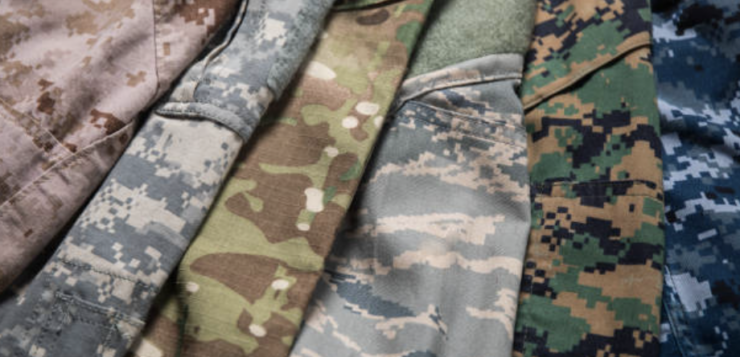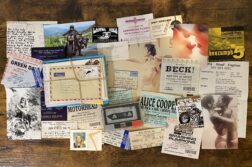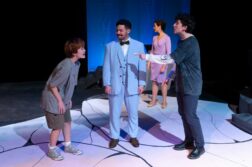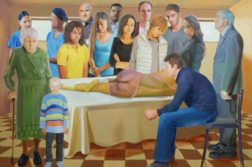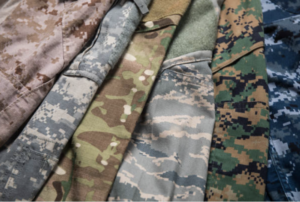
Being transgender is hard. From the dysphoria that arises in transgender folks from the incongruence of how they are versus how they wish they could be, to the internal struggle to accept themselves, every aspect of transition challenges you. For me, I felt I had no choice but to transition. My life was on the line, and it was never easy.
In 2016, I was in the military, about to visit my therapist for depression and gender dysphoria. I cried before I went in, staring up at the looming hospital tower and wondering if things would ever change. Unbeknownst to me, that very day, they would.
As I sat in his office, he stood, walked out, and returned fifteen minutes later with a prescription for estrogen. The box of estrogen patches that I picked up from the pharmacy afterwards constituted a life goal of mine, finally achieved. A mountain climbed.
So, it may be a shock to learn that I tried to kill myself a month later.
2008 was the year I learned of the term ‘transgender.’ At age thirteen,
Transgender came to define my understanding of my gender in my teens. I realized the word represented a core piece of my identity as a human being, a fundamental building block of my psyche that ached. Now, I finally had a label for it; this made it more bearable.
I eventually told my parents that I cross-dressed, and got a clumsily handled reaction to the announcement. Both times I attempted to come out of the closet before joining the military I was met with drastic rejection. Coming out hurts. It’s hard, and scary, and oftentimes painful. The wound of dysphoria persists, however, and just like a continually shaken bottle of champagne, the cork eventually pops. After years of suppression, I felt I had no choice but to let that cork fly.
In 2013, I left my parents’ house for the military. Every time I looked at myself in the mirror I saw a man, and that just wasn’t me. I eventually stopped looking at myself in the mirror.
Desperate, I started running. I ran to get slim, to be feminine, but I also ran from my problems. It alleviated the suffering to be thin and petite. I could catch angles of myself in the mirror that I thought were quite womanly, and for the first time, I felt some sense of acceptance toward my body.
This, of course, acted as a band-aid. When I turned 21, mere months before I would get my life-changing prescription, I started drinking in earnest. I found it easier to just drown the thoughts than to face or run from them. I could chug through bottles of liquor in a single night, and do it again the next day. This ended with me in the hospital, in a blackout state that I can’t remember even to this day.
My unit mandated therapy for me after a brief inpatient stay in the military hospital’s psych ward. It had just recently become acceptable to transition during active duty service and, knowing that, in the dim light of a psychiatrist’s office, I finally told someone the truth.
And thus, we return to my suicide attempt.
A month after receiving my hormones, just after the new year rolled over and 2017 made its grand entrance, I found myself severely struggling. I hardly knew myself. I didn’t know what I wanted to do with my life or where my life was even heading. I didn’t know what I liked, what I would tolerate, or what I would accept. All I knew was that I still saw a man in the mirror. That’s when it dawned on me: I might never see a woman in the mirror. I might always see a man.
This broke me. After a lonely weekend of self-loathing, I opened a bottle of antihistamines and downed them all.
To this day, this memory is burned in my mind. After another stint in a psych ward, I let myself wear feminine clothing, buy a wig, and get my ears pierced. I could no longer hide and had to be brave in the face of a whole new life path. If I could be brave, I could be free. I went out dressed up for the first time with a friend. Donned in my wig and tunic and jeans, I finally found the courage to and bravely took my first steps out of my door, and into the light of day.
The more visibly out I was, the more hate I got. People began harassing me from their cars and bedroom windows, shouting things at me and mocking me – especially over the internet – and this made accepting myself all the more difficult. Many hate me now for who I am.
I got out of shape and started smoking more. I grew angry and lashed out. I hid away from people. In 2019, through a series of cascading events – drugs, assaults, and losses – I wound up home again, having crashed and burned out of the military. Upon arriving, I told my female family members and friends that I had been assaulted, and another defining moment in my transition occurred: “Welcome to being a woman.”
The mere statement alone shocked me, let alone the implications. I was, at first, offended and hurt that I hadn’t been taken seriously or comforted. Later I would have a deep sense of empathy for that comment. I realized that the female experience wasn’t purely exploratory and euphoric anymore. It has dark sides to it, and that now landed on my shoulders. I moved out soon after, and started 2020 in an apartment of my own, my relationship with my own transition weighing heavily on me.
Cigarettes and God became my friends for a time, before I connected with a transgender community on Discord that I found extreme solace in. Without them, I would have been alone. Nobody told me that, about being transgender. It can be lonely. Isolation comes naturally to the socially strange, and we were no exception. Even as I began to truly discover myself, I also began to destroy myself in my vulnerable solitude. I hid away in my apartment, chain smoked, drank, and grappled with the severe psychological issues I had surrounding my perception of self.
My psyche deteriorated; I started to see myself as a freak because I wasn’t “passing” as well as I thought I would.
Soon after, in a moment of bravery, I finally conquered my suicidal ideation. I accepted that I wasn’t perfect ,but that I had capabilities that could save me from myself. I put the gun down and stood, resolved to never be in that position again. I would learn about and be myself. I started a new journey, down a new road. This one taught me to be confident with who and what I am. It taught me to be honest with myself and others. It taught me to love myself. My transition continued to evolve, and so did I.
… which leads me to now, today. I don’t pass well. I get misgendered as sir a lot, and called ma’am occasionally. Still, I’ve come to see myself as who I truly am in the mirror, not as the facade of a man nor as the dress of a woman. My gender has ceased to matter to me, because I’ve conquered it inside of myself. Years of pondering and anguish have led me to know it better than I know any other piece of myself.
I staked my life on my transition being a success. Turns out, that was only half the battle. The other half was accepting the person I would become during it, and that was honestly the hardest part. Being transgender is hard, but it is worth it.
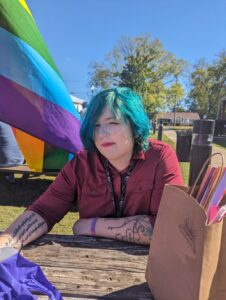 Sabrina Godlewski has been writing for 14 years, and has two fiction novels under her belt. She has served in the United States Air Force for five years and has travelled extensively, collecting stories and experiences in need of telling. She currently lives with her wife and dog and is planning to continue her adventures across America.
Sabrina Godlewski has been writing for 14 years, and has two fiction novels under her belt. She has served in the United States Air Force for five years and has travelled extensively, collecting stories and experiences in need of telling. She currently lives with her wife and dog and is planning to continue her adventures across America.


